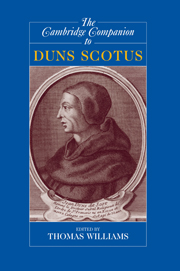Book contents
- Frontmatter
- Introduction
- 1 Scotus on Metaphysics
- 2 Space and Time
- 3 Universals and Individuation
- 4 Duns Scotus’s Modal Theory
- 5 Duns Scotus’s Philosophy of Language
- 6 Duns Scotus on Natural Theology
- 7 Duns Scotus on Natural and Supernatural Knowledge of God
- 8 Philosophy of Mind
- 9 Cognition
- 10 Scotus’s Theory of Natural Law
- 11 From Metaethics to Action Theory
- 12 Rethinking Moral Dispositions
- Bibliography
- Citations of works attributed to John Duns Scotus
- Index
8 - Philosophy of Mind
Published online by Cambridge University Press: 28 May 2006
- Frontmatter
- Introduction
- 1 Scotus on Metaphysics
- 2 Space and Time
- 3 Universals and Individuation
- 4 Duns Scotus’s Modal Theory
- 5 Duns Scotus’s Philosophy of Language
- 6 Duns Scotus on Natural Theology
- 7 Duns Scotus on Natural and Supernatural Knowledge of God
- 8 Philosophy of Mind
- 9 Cognition
- 10 Scotus’s Theory of Natural Law
- 11 From Metaethics to Action Theory
- 12 Rethinking Moral Dispositions
- Bibliography
- Citations of works attributed to John Duns Scotus
- Index
Summary
As many commentators have noticed, medieval views on the relation of mind and body occupy a strange territory somewhere between substance dualism, on the one hand, and some form of materialism, on the other. On the one hand, the medievals were convinced that the soul is an immaterial agent, causally responsible for our intellectual activities - causally responsible independently of the body - on the other hand, they were all convinced that body and soul are united in such a way as to form one (composite) substance. While there was widespread agreement about the correct understanding of the first of these two claims - that the soul is an individual immaterial object - there was considerable disagreement about the correct understanding of the second. The consensus was that the soul is in some sense an (Aristotelian) form of the body. But there was no corresponding consensus about what it is to be a form.
THE IMMATERIALITY OF THE SOUL
Scotus’s account of the immateriality of the soul springs from a discussion of the immateriality of human cognition and will. The argument from cognition focuses on an argument proposed by Aquinas in defence of the immateriality of the soul. According to Aquinas, we can infer the immateriality of the soul from the immateriality of mental acts.
- Type
- Chapter
- Information
- The Cambridge Companion to Duns Scotus , pp. 263 - 284Publisher: Cambridge University PressPrint publication year: 2002
- 2
- Cited by



